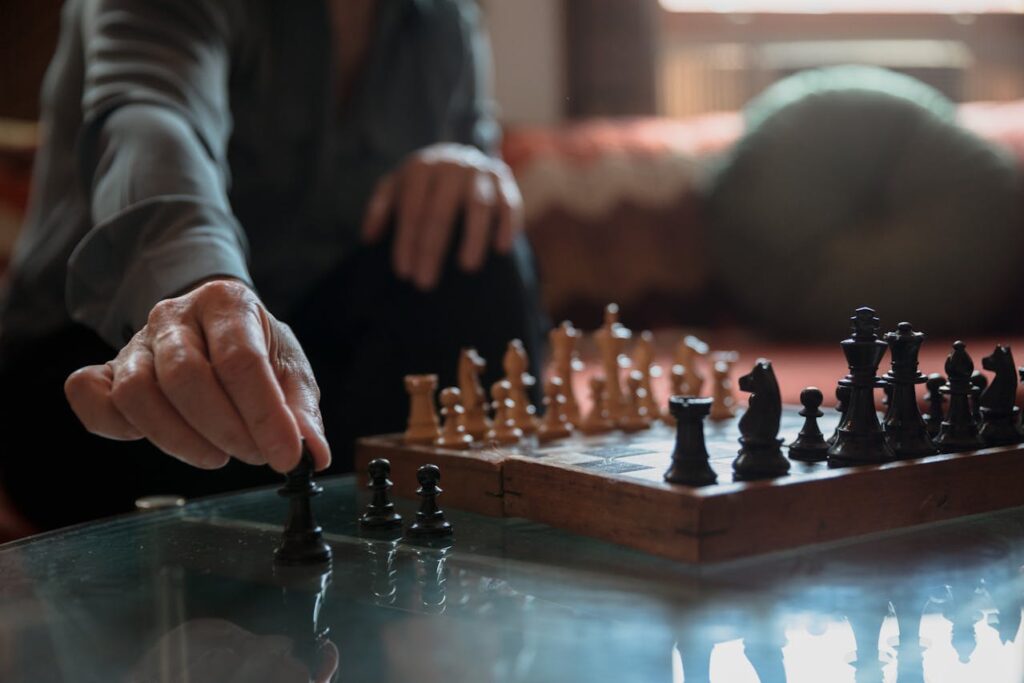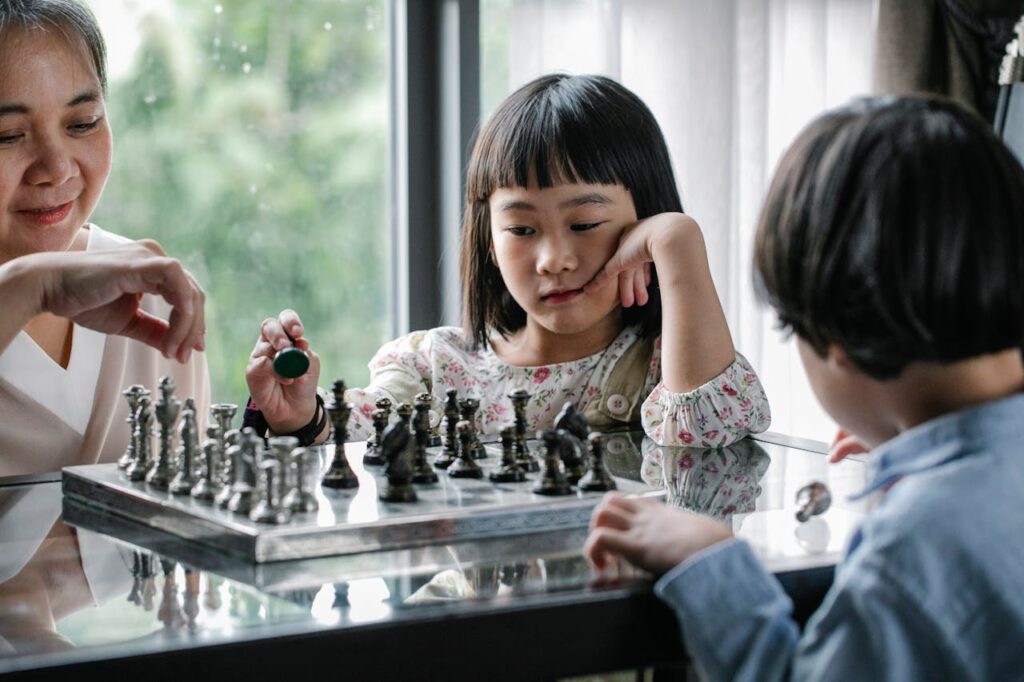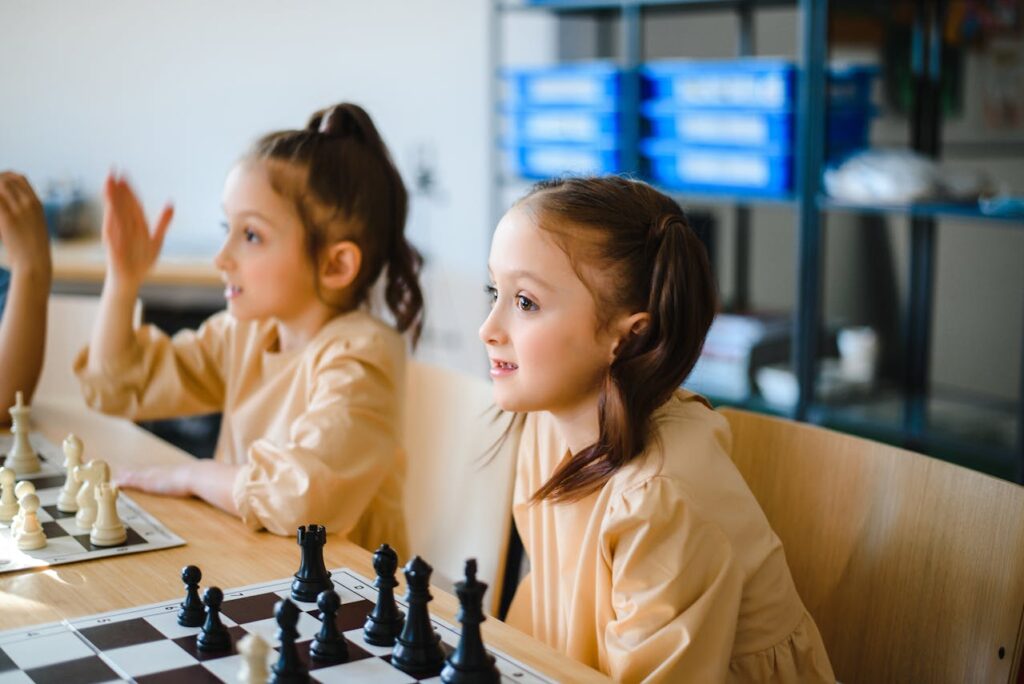Chess is often viewed as a game of strategy and intellect, but recent studies and real-life examples suggest that its benefits go far beyond the chessboard. Playing chess can enhance critical thinking, improve concentration, and even boost academic performance in subjects like math and reading.
In this article, we’ll explore the surprising connection between chess and better school performance, and explain how this ancient game can give your child an academic edge.
How Chess Enhances Cognitive Skills
One of the most significant ways chess impacts school performance is by enhancing cognitive skills. Cognitive skills are the mental abilities that we use to learn, think, remember, and problem-solve.
They are the foundation for all learning, and chess is particularly effective at strengthening these abilities.
Boosting Memory and Concentration
Chess requires players to remember various strategies, recognize patterns, and anticipate their opponent’s moves. This constant mental exercise improves both short-term and long-term memory.
For instance, when a child plays chess, they need to recall previous games, remember how their opponent tends to play, and keep track of potential moves several turns ahead.
This process of memorization and recall can help children improve their ability to remember details in their schoolwork.
Moreover, chess teaches children to focus intensely on the task at hand. During a game, losing concentration for even a moment can result in a critical mistake.
This need for sustained focus can translate into better concentration in the classroom.
Enhancing Problem-Solving Skills
Every chess game is a series of problems that need to be solved. How do you protect your king while putting pressure on your opponent?
What’s the best way to capitalize on a mistake your opponent made? These are just a few of the questions that players must answer during a game.
By regularly engaging in chess, children develop strong problem-solving skills.

They learn to break down complex problems into smaller, more manageable parts, consider multiple solutions, and choose the best course of action based on the information available.
This methodical approach to problem-solving is incredibly valuable in school, where students are often required to solve math problems, analyze texts, and conduct experiments.
Encouraging Critical Thinking
Critical thinking involves analyzing information, evaluating different perspectives, and making reasoned decisions.
Chess is an excellent way to develop this skill because it requires players to think several moves ahead, anticipate their opponent’s actions, and adapt their strategies as the game progresses.
When playing chess, children learn to evaluate the strengths and weaknesses of their position, identify potential threats, and make decisions based on logic rather than impulse.
This type of critical thinking is directly applicable to school subjects like science, where students must evaluate evidence, draw conclusions, and think critically about how to solve complex problems.
Improving Mathematical Abilities
The connection between chess and math is particularly strong. Chess involves a lot of abstract thinking, pattern recognition, and logical reasoning—all of which are foundational skills in mathematics.
By practicing these skills in a fun and engaging way, chess can help children improve their math abilities.
For instance, when planning their moves, chess players must calculate potential outcomes and visualize different scenarios.
This type of thinking is very similar to solving math problems, where students must consider different factors, use logical reasoning, and follow a sequence of steps to reach the correct answer.
Chess and Academic Subjects: A Strong Connection
Chess isn’t just a game that sharpens the mind; it’s also a tool that directly supports academic learning.
By enhancing cognitive abilities, chess can have a measurable impact on a variety of school subjects, from math to reading to even social studies.
Strengthening Mathematical Thinking
As we touched on earlier, the skills developed through chess—such as pattern recognition, logical reasoning, and spatial awareness—are closely related to those required in mathematics.
Chess players often engage in activities similar to mathematical problem-solving, such as calculating risks, weighing probabilities, and considering multiple variables before making a decision.
For instance, when a child contemplates a move, they must mentally calculate the implications for the entire board.
This process involves a great deal of abstract reasoning and the ability to manipulate ideas in one’s mind—skills that are directly applicable to math.
These mental exercises translate well into the classroom, where children might be required to solve complex equations, understand algebraic expressions, or grasp geometric principles.
Enhancing Reading Comprehension and Language Skills
Although chess is a game of strategy and logic, it also enhances reading comprehension and language skills.
This may seem surprising, but the cognitive processes involved in understanding complex texts are similar to those used in chess.

Both require concentration, critical analysis, and the ability to recognize patterns and relationships.
When playing chess, children must follow the narrative of the game—what has happened, what is happening now, and what might happen next.
This mirrors the process of reading, where understanding the sequence of events and anticipating possible outcomes is key to comprehension.
Additionally, chess teaches children to focus on details, analyze information critically, and make connections between different pieces of information.
Supporting Science and Logical Reasoning
Science is another subject that benefits greatly from the skills developed through chess.
The game encourages logical reasoning, hypothesis testing, and the scientific method—all of which are essential for success in science.
In chess, players constantly test hypotheses about how their opponent might respond to certain moves. They must gather information, form predictions, and test their ideas through their moves.
This process is remarkably similar to the scientific method, where scientists develop hypotheses, conduct experiments, and analyze data to draw conclusions.
Moreover, the strategic thinking required in chess helps students understand scientific concepts and processes.
For instance, when learning about cause and effect in science, a child who plays chess might find it easier to grasp how one event can lead to another, just as a series of chess moves can lead to a particular outcome on the board.
Improving Social Studies Skills
While it might not be immediately obvious, chess can also enhance a child’s understanding of social studies.
The game teaches critical thinking, perspective-taking, and strategic planning—all skills that are essential for analyzing historical events, understanding political systems, and exploring cultural interactions.
For instance, when studying history, a child might need to consider the motivations of different historical figures, much like they consider the motives and possible moves of an opponent in chess.
The ability to think strategically and anticipate the actions of others can help students better understand historical events and the decisions that shaped them.
Furthermore, chess teaches children to recognize patterns and relationships, which can help them identify connections between historical events, understand the cause-and-effect relationships in history, and make sense of complex social and political systems.
Building Emotional and Social Intelligence Through Chess
Beyond its cognitive and academic benefits, chess also plays a crucial role in developing emotional and social intelligence.
These skills are essential for success in school and life, helping children navigate relationships, manage their emotions, and work effectively with others.
Enhancing Emotional Control and Patience
Chess teaches children the value of patience and emotional control. A chess game can be intense, requiring players to stay calm and focused, even when the stakes are high.
Children learn that reacting impulsively—whether in excitement or frustration—can lead to mistakes that might cost them the game.
By playing chess, children practice staying composed under pressure, a skill that is incredibly useful in both academic and social settings.
For example, during a challenging exam or when facing a difficult situation with a peer, a child who has developed emotional control through chess is more likely to remain calm, think clearly, and make rational decisions.
Moreover, chess teaches children to be patient. A well-thought-out strategy in chess often requires waiting for the right moment to strike, rather than rushing into action.
Developing Resilience and Perseverance
Resilience—the ability to bounce back from setbacks—is a key quality that chess helps to build. In chess, losing is an inevitable part of the learning process.
Even the best players lose games, sometimes due to small mistakes or an opponent’s brilliant strategy. What matters most is how a player responds to a loss.
Chess teaches children that losing is not the end, but rather an opportunity to learn and improve.
After a game, players are encouraged to reflect on their mistakes, understand what went wrong, and think about how they can improve in future games.

This process of learning from failure fosters a growth mindset, where children see challenges as opportunities for growth rather than as insurmountable obstacles.
This resilience is incredibly valuable in school, where students regularly face challenges that test their abilities.
Whether it’s a difficult subject, a tough exam, or a personal setback, the ability to persevere and keep trying, even after experiencing failure, is crucial for long-term success.
Fostering Respect and Good Sportsmanship
Chess is a game that demands respect for both the game itself and one’s opponent.
From a young age, children learn the importance of playing by the rules, respecting their opponents, and handling both victory and defeat gracefully.
These lessons are essential for developing good sportsmanship and building positive relationships with others.
For example, in a chess match, a child must respect their opponent’s skill, even if they win the game. They learn to shake hands, congratulate their opponent, and reflect on the game together.
This behavior fosters mutual respect and helps children understand the importance of treating others with kindness and dignity, regardless of the outcome.
Good sportsmanship extends beyond the chessboard and into everyday life.
In school, children who practice good sportsmanship are more likely to collaborate effectively with peers, resolve conflicts peacefully, and build strong, positive relationships with their classmates.
They understand that success is not just about winning, but about how they conduct themselves, treat others, and learn from their experiences.
Improving Social Interaction and Communication Skills
While chess is often seen as a solitary game, it actually provides numerous opportunities for social interaction and the development of communication skills.
Whether playing in a chess club, participating in a tournament, or simply discussing strategies with a friend, chess encourages children to engage with others in meaningful ways.
For instance, children in a chess club might discuss different openings, share tips on improving their game, or analyze a recent match together.
These conversations help children develop the ability to articulate their thoughts, listen to others, and engage in respectful dialogue—skills that are essential for effective communication.
Additionally, chess often requires players to put themselves in their opponent’s shoes, anticipating their moves and understanding their strategies.
This practice of perspective-taking helps children develop empathy, as they learn to consider and understand different points of view.
Encouraging Collaboration and Teamwork
While chess is typically a one-on-one game, it also offers opportunities for collaboration and teamwork, especially in team-based chess tournaments or group learning environments.
In these settings, children must work together, share ideas, and support one another to achieve a common goal.

For example, in a team chess tournament, players might work together to develop strategies, analyze their opponents, and encourage each other throughout the competition.
This collaborative experience teaches children the value of teamwork and how individual contributions can lead to collective success.
This focus on collaboration is essential for success in school, where teamwork and cooperative learning are increasingly emphasized.
By learning to work effectively with others through chess, children develop the ability to contribute to group efforts, share responsibilities, and support their peers in achieving common goals.
Long-Term Benefits: Preparing for the Future
The skills developed through chess—cognitive, emotional, social, and academic—have long-term benefits that extend far beyond childhood.
As children grow, these skills become the foundation for success in higher education, careers, and personal relationships.
Success in Higher Education
The critical thinking, problem-solving, and strategic planning skills developed through chess are highly valued in higher education.
Whether a student pursues studies in science, technology, engineering, mathematics (STEM), the humanities, or the arts, the abilities honed through chess will serve them well.
For example, in college or university, students are often required to analyze complex information, develop original ideas, and present well-reasoned arguments.
The analytical thinking and creativity fostered by chess provide a strong foundation for these academic challenges.
Moreover, the patience, persistence, and resilience developed through chess help students manage the demands of higher education, such as balancing coursework, research, and extracurricular activities.
Chess teaches students how to plan their time effectively, stay focused on long-term goals, and overcome setbacks—all of which are essential for academic success.
Building a Strong Career Foundation
The skills developed through chess are also highly valued in the professional world.
Employers increasingly seek candidates who possess strong problem-solving abilities, critical thinking skills, and the ability to work both independently and as part of a team.
Chess helps children develop these qualities from a young age, giving them a competitive edge in the job market.
For instance, in careers that require strategic thinking, such as business, law, or management, the ability to anticipate challenges, plan ahead, and make informed decisions is crucial.
Chess players, who are accustomed to thinking several moves ahead and adapting their strategies, are well-prepared for these roles.
Additionally, the emotional intelligence and social skills developed through chess are essential for building strong professional relationships, leading teams, and navigating the complexities of the workplace.
Lifelong Learning and Personal Growth
Perhaps one of the most important long-term benefits of chess is its role in fostering a love of learning and personal growth.
Chess teaches children that learning is a continuous process and that there is always room for improvement.

This mindset encourages lifelong learning, where individuals continue to seek out new knowledge, develop new skills, and grow as individuals throughout their lives.
Whether it’s pursuing new hobbies, continuing education, or exploring new career paths, the skills and mindset developed through chess prepare individuals for a lifetime of learning and personal growth.
Chess provides a solid foundation for a fulfilling and successful life, where the pursuit of knowledge, creativity, and personal development is always at the forefront.
Conclusion
The surprising link between chess and better school performance is no coincidence.
Chess is a powerful educational tool that enhances cognitive abilities, supports academic learning, and develops essential life skills.
By encouraging critical thinking, problem-solving, emotional intelligence, and social skills, chess prepares children not only for academic success but also for a successful and fulfilling life.
At the Global School of Chess, we are passionate about helping children unlock their full potential through the game of chess.
Our programs are designed to be engaging, accessible, and tailored to the individual needs of each student.
Whether your child is just starting out or looking to improve their skills, we are here to support their journey every step of the way.
READ NEXT:
- Chess and Creativity: Unlocking New Thinking Patterns
- How Chess Builds Resilience in Children
- Chess as a Tool for Maintaining Mental Sharpness in Later Life
- Boosting Memory and Focus: The Cognitive Benefits of Chess for Adults
- How Chess Sharpens the Adult Brain: A Cognitive Powerhouse
- Chess for Calm: Reducing Stress in Kids
- The Science Behind Chess and Improved Decision-Making for Adults

